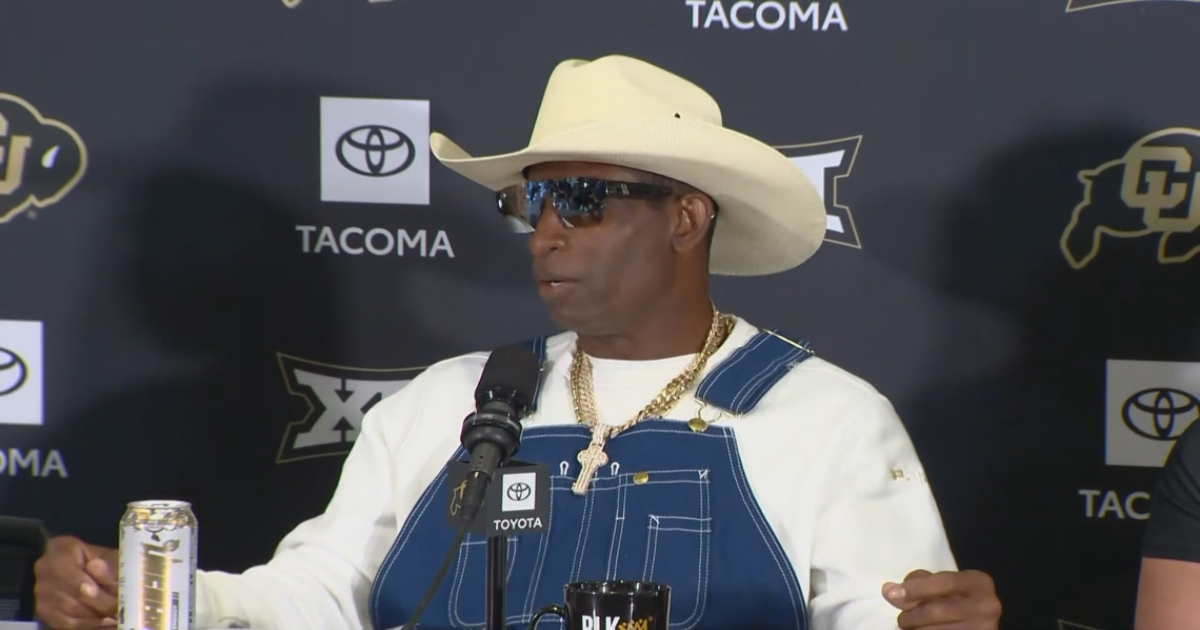GREENWOOD VILLAGE, Colo. — Coach Prime opened up on Monday about the health issues that kept him from his team during the offseason.
Deion Sanders announced that he had been diagnosed with an aggressive form of bladder cancer. After surgery, his oncologist considers him cured.
“Slowly but surely I built myself back up to where I’m able, I’m strong, I’m ready,” Sanders said. “I’m still probably about 12 pounds down, but I’m gonna fill these overalls up like no other. But it has been a tremendous journey, and I’m truly thankful that God, God is so good, God is so good. You have no idea.”
The 57-year-old said he’s ready to lead the CU Buffs in the upcoming season. Now, he’s urging people to get checked out if something with their health feels off.
“Please get yourself checked out, especially African American men,” Sanders said. “We don’t like going to the doctors. We don’t like nothing to do with a doctor. You know that. So I’m not just talking to the brothers. I’m talking to my Caucasian brothers, my Hispanic brothers, my Asian brothers, my everybody, and my sisters. And that’s all y’all, get checked out.”
Dr. Ozzie Grenardo hopes people hear Coach Prime’s message.
“He is the voice for people to have that impetus to go out and do it, and I love it because hopefully people will listen to that message,” said Grenardo, the Medical Director for the Center for African American Health in Denver.
Grenardo knows the data. Black men are less likely to seek out preventative healthcare and routine exams.
The Tuskegee experiments and decades of racism left many Black men distrustful of the health care system. Gerardo said that’s led to a healthcare disparity.
“There are studies that show docs that are treating patients for the exact same condition with the same background, when they are looking at a Black patient versus a white patient, the Black patient has gotten, in some of these studies, less care, less appropriate care or less aggressive care than what they should get, which is incredibly problematic,” Grenardo said. “But that trust, it’s hard to build up if you’ve had that historical vantage point of really being discriminated against.”
Grenardo believes Sanders sharing his bladder cancer diagnosis with the world may help bridge that gap, starting by encouraging Black men to be checked out.
“What we find with Black men, especially in bladder cancer, is that bladder cancer is less likely to happen in Black men, but much more harmful and found later on than any other group,” Grenardo said. “Too often people are left behind in the care that they get because the diagnosis comes too late.”
Grenardo said in some ways, Sanders is lucky. Other medical testing caught the cancer.
“Because if it wasn’t for me get tested for something else, they wouldn’t have stumbled up on this,” Sanders said.
As part of his treatment, doctors removed his bladder and now consider him cancer-free.
“And I know it’s a lot of people out there going through what I’m going through and dealing with what I’m dealing with. And let’s stop being ashamed of it, and let’s deal with it, and let’s deal with the head on,” Sanders said.
“If Deion could tell the whole world those kind of jokes and with the grace and humor and spirituality that he’s going through this with, hopefully people will find it in themselves to actually come out and get screened and talk about these things because they’re important,” Grenardo said.
If you, like Sanders, are having issues with urination, Grenardo said you should ask your doctor about a urinalysis. That can identify issues with your bladder, glucose levels, prostate health, and kidney function.
If you don’t have access to care, consider a free clinic like the one the Center for African American Health holds Tuesday evenings from 5:30 p.m. – 9 p.m.
Grenardo said it’s critical to catch health issues early on, before they become serious.
